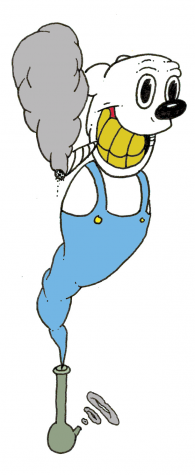BUY THIS ARTICLE
You already know the drill. The Christmas music starts playing, eggnog appears on supermarket shelves, and sparkling lights illuminate homes on every block as the weather starts to chill. Yet something else is also going up. Holiday wish lists scrawled with the latest objects that we need: New Yeezys, Forever 21 gift cards, and a Toyota Tacoma.
Companies anticipate the most profitable time of the year and the most “beloved” holidays in America: Black Friday and Cyber Monday. Millions feel the inexplicable urge to have fist fights in Walmart parking lots over flat-screen TVs.
Ah yes, the joy of the holidays.
The cheer and gratitude that’s supposed to be experienced during the holiday have been replaced with stress over buying multitudes of gifts for family and friends. Parents who can’t afford household bills are made to feel inadequate for not buying their children tons of presents and, for many children, holidays without “suitable” presents is a failure. How did we end up like this?
The holiday season has been effectively commodified. Formerly celebrating family and friends and appreciating what we already have, in recent decades businesses have created a season revolving around spending. American Christmas profits have exceeded $ 1 trillion in recent years. Yes, it’s now the most wonderful time of the year… for corporations.
But really, once all is said and done, the gifts once so zealously desired will be forgotten by January, as the desire for new distractions builds once again. It’s a never-ending cycle: Buy, bored, buy, bored.
Unfortunately, this consumerism permeates every part of American society. Companies convince consumers that their products will make them sexier, cleaner, thinner, smarter, and happier. Many of us are under the misconception that buying this and that will fix our problems, when it does nothing but drain our wallets and steadily fill our homes with clutter. The market booms, while happiness and fulfillment drops.
There are now more televisions in America than people.
A 2009 study by the University of Rochester found that those who have more extrinsic goals, such as making money or gaining fame, are more likely to experience negative emotions and physical ailments, compared to those who have more intrinsic goals, such as improving relationships or helping others.
A keystone value of America is the idea of the self-made man, someone who rose from nothing to become a millionaire or billionaire. However, beneath this value of working hard is a far more sinister mechanism. People will work slavish hours, neglect family and friends, and hurt others in their ambition for money and more stuff: bigger houses, fancier cars.
But it’s never enough. The hunger for more will invade our psyche as we continue to ruin our lives in pursuit of the next thing, and the next and the next. But this happiness is always temporary. We keep returning in search of more. By the age of 80, we’ll realize that we’ve wasted our lives in pursuit of a happiness that has always been present if we could just find it.
This addiction to more isn’t just a problem of the affluent, either. According to statistics published by the Bureau of Labor Statistics, America’s poor have much of the same material goods (televisions, cars, smartphones) as the affluent.
This addiction doesn’t discriminate across economic and social classes. The very people who cannot afford healthcare or higher education are some of the most susceptible to seeking escape from unhappiness and stress through buying more. According to a 2014 article by the New York Times, “Money relieves suffering in cases of true material need. But when money becomes an end in itself, it can bring misery, too.”
The pursuit of happiness through shopping brings to mind the myth of Sisyphus, forever pushing a rock up the hill, only for it to fall and for him to start again. The situation appears simultaneously ridiculous and tragically destructive.
Until we learn to distance happiness from materialism, we can never truly be happy.
Your donation will support the student journalists of Archie Williams High School. Your contribution will allow us to purchase equipment and cover our annual website hosting costs. Each donation will receive a magazine subscription for a year (6 copies a year), and become a part of the important work our publication is doing.
$35 -- Subscription to the magazine
$50 -- Silver Sponsorship
$75 -- Gold Sponsorship
$100 -- Platinum Sponsorship











